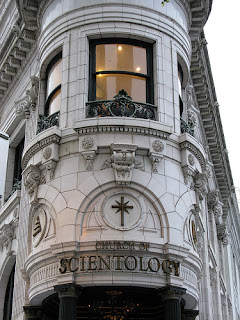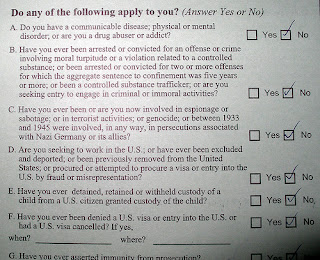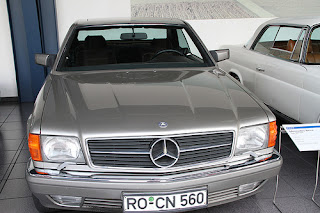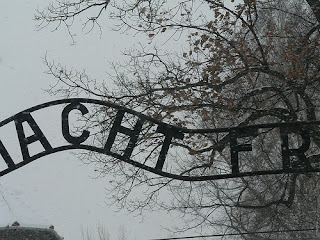 |
Image of Rajneesh Shree Bhagwan materials,
by timogan via Flickr.com |
I represented the Consulate General at a demonstration in Stuttgart one day. The event - a protest march by followers of Bhagwan Shree Rajneesh who had established an intentional community (aka commune) outside the town of Antelope, Oregon. The community was known as Rajneeshpuram. By 1984, the year before I arrived in Stuttgart, Rajneeshpuram was a city of up to 7,000 people, complete with typical urban infrastructure such as a fire department, police, restaurants, malls, townhouses, a 4,200-foot (1,300 m) airstrip, a public transport system using buses, a sewage reclamation plant and a reservoir. The Rajneeshpuram post office had ZIP code 97741 and it quickly outgrew the size of Antelope itself.
Followers were known as Rajneeshees and for some reason a lot of Germans were drawn to the movement. Rajneeshees were identifiable by the yellow, orange, or red clothing they wore. When they applied for a permit to demonstrate their disappointment with the Consulate's reputation for looking on applicants from Germany who wished to travel to Rajneeshpuram to take part in the Bhagwan's training programs unfavorably, the police informed the Consul General, and he designated me to meet them. It wouldn't have been appropriate for him to meet with them as his stature might encourage someone to believe the protest was being taken seriously. With me, the most junior level American staff member of the Consulate General, to greet them, there would be no such misunderstanding. I was advised to say nothing, just take what they had to give me and then come back into the building.
The Rajneeshees assessment of the Consular Section was accurate. We didn't issue visas to Rajneeshees who applied for tourist visas to travel to take part in a training program that didn't have specific start or end dates. Rajneeshpuram wasn't a recognized educational institution, so they couldn't issue the I-20 form required for us to issue student visas. It wasn't a recognized exchange program organization, so they couldn't issue the IAP-66 form required for us to issue an exchange program visa. About the only category of visa that would work for Rajneeshees who wanted to travel to Antelope, Oregon, was an immigrant visa. But we didn't issue immigrant visas. In addition, immigrant visas are issued on the basis of categories, most of which are for family reunification. Even if a German Rajneeshee had a sponsor for an immigrant visa, they would fall into a category that would mean a many year wait for his or her name to come to the top of the list.
When the demonstrators arrived at the Consulate General, I went out to meet them to accept their letter of complaint and a large bunch of flowers. I was a little disappointed that they didn't bring an elephant to their protest march that year. I had been told in the past they had always arrived with an elephant.
 |
Image of Church of Scientology
by spaceninja, via Flickr.com |
Another near-cult-like group that sponsored applicants to travel to the United States for training was the Church of Scientology. I didn't know much about Scientologists before I arrived in Germany, but I got to know a lot about them very quickly. Adjudicating their visa cases was much more challenging because they had managed to get blanket approval for clergymen from the church to travel to the United States for extended stays. That meant that each of them applied for a different class of visa, a work visa, not a tourist visa. And since the Immigration and Naturalization Service had issued blanket approval for clergymen, we were left with determining whether the applicants qualified as clergymen.
One memorable applicant was not yet 18 years old. Dietrich* applied under the blanket petition as a clergyman. He had already traveled to Clearwater, Florida, one of the centers for Scientology, and completed some of the church's training. He wanted to return to Florida in order to complete more training and take up duties as a clergyman.
About the time Dietrich arrived for his interview, his grandmother was on the phone to beg us not to issue him a visa. She said Dietrich's parents were supportive of his desire to travel to the United States, but he had already dropped out of high school in Germany to make the trip and she worried that he would never succeed without completing his education.
His grandmother was probably worrying for no reason. One of the qualities I recognized in all applicants who wanted to travel for further Scientology training was their self-confidence. I had little doubt that Dietrich was going to succeed at whatever he put his mind to. But since he was still a minor, traveling to Clearwater as a minister of the Church of Scientology was not in his cards yet. I advised him to complete his education in Germany and then consider at a later age whether his future was still with Scientology.
Another applicant whose arrival coincided with a phone call from a worried relative, Manuela,* wanted to travel to New York so that she could be a volunteer with Covenant House, a program devoted to providing support for homeless children, many of whom had been abused or were abusing illegal substances. Covenant House operated with the assistance of hundreds of volunteers who paid their way to the cities where their houses were located and who lived with the children resident there. Volunteers received no payment.
This was not my first introduction to Covenant House as I learned about it during my summer in New Jersey when five of my fellow volunteers with the Christian Neighborhood Summer Program met a young woman from Georgia who had run away from her parents and made her way to New York. We six bleeding heart liberals from across the midwest tried to find a safe place for her to stay that night. A surreptitious telephone call to the New York Police by one of our group led to the tip that she might be able to stay at Covenant House, but when they learned she said she was 19, they told us she was too old.
Then just before I ended up joining the State Department, a friend in Minneapolis told me he had decided to sell lhis house and use the proceeds of the sale to fund a year of volunteering with Covenant House. So while Manuela wanted to volunteer, I had a pretty good idea of just what it was going to cost her to volunteer. I had already spoken to her mother who told us she opposed Manuela's plans. Because I hadn't yet met Manuela, I explained to the mother that I could only make a decision based on what Manuela presented, especially since it was clear that Manuela was no longer a minor. I asked Manuela how she expected to pay her expenses in New York since her parents wouldn't be helping her. She downplayed the amount of money she thought she would need and that was the basis for my refusing her application - she didn't have adequate funds for the purpose of the trip.
 |
Whitney Museum of Modern Art by beautifulcataya,
via Flickr.com |
The most memorable of applicants who applied to spend a year in the United States was Elke.* Elke applied to spend a year in New York on an internship with the Whitney Museum for the year after the conclusion of her university studies in the U.S. A fifth year in the U.S. was common for foreign students, but it required an exchange visitor visa or an extension of the student visa. In Elke's case, the internship was organized through Max Factor, not a university, so an exchange visitor visa is what she needed. Elke initially submitted her application through the mail, but since she didn't have an IAP-66 form, needed for us to issue an Exchange Visitor visa, we sent her application and passport back to her with a form telling her she should reapply when she received an IAP-66. Instead, Elke returned and presented the letter she received from the Whitney Museum that explained they weren't approved for issuing IAP-66 forms. The woman who wrote the letter explained that other foreign students who spent an internship year with the museum were willing to hide their intended purpose at the time they applied for visas as they felt the opportunity was too good to pass up. She further suggested that Elke might try getting a new passport and then reapplying in person, wearing a scarf and coat so that no one at the consulate would recognize her from her previous application.
Elke refused to lie. She presented all her documents with her application and asked us what she was supposed to do. The employee who took her application at the window handed the package over to Elizabeth, the senior local employee in the Visa Section. Elizabeth read through everything and brought the package to me to ask if I thought the Whitney Museum was connected in any way to our boss whose last name was Whitney. We brought the package to Ms. Whitney who read through everything and then began laughing a bit and said, "Dear Aunt Gertrude" while shaking her head. She volunteered to talk with the applicant and then she got on the phone with her extended family to explain what they needed to do to get on the list of organizations approved to issue IAP-66 forms so that Elke could join their internship group in September.
Elke returned a week later with an IAP-66. We were happy to issue her visa.
*A name, not necessarily the right one.



















